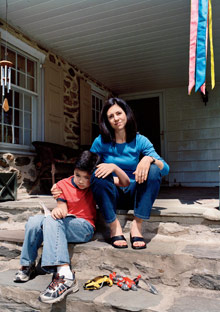An Inconvenient Youth: Raising Children with Autism

Photo: Alessandra Petlin
In Philadelphia, a group of gutsy, sharp-witted, wisecracking mothers (and one honorary dad) are raising kids with autism. From diagnosis (saying the A word) to leaving no treatment untried (avocado, really?) to loving and admiring what can't be "fixed," they're in it together.
I have loved my friend Erin Lopes since seventh grade, despite the fact that she's incredibly smart, hilarious, and looks like Natalie Wood. After working in epidemiology at the California Department of Public Health and earning a master's degree from UC Berkeley, Erin, continuing her trend toward excellence in all things, married Tim, a handsome attorney. They then had a boy and a girl, and bought a two-story house surrounded by trees in a cul-de-sac in suburban Philadelphia, which looks so adorable with its warm yellow lights that when we all pulled into the driveway the first time, I cracked, "Dude, who's your architect? Thomas Kinkade?" I love Erin's kids, and am frequently rewarded with unidentifiable ceramic creations and fabulous felt-pen portraits. Evelyn, 8, is approximately 45 pounds of eyes, knees, pink plastic jewelry, and dimples. Thomas, who's 9, has such winning movie star looks, I call him Keanu Jr. You perceive that he's wired a little differently only when he talks.
On a recent visit, I walked into the house and gave Thomas a hug. "All that, just because of a cup of coffee!" he said in a cheesy TV announcer voice, rubbing my kiss off—a fantastic non sequitur that charmed my socks off. I am biased, naturally, as his honorary auntie. In 2002 Erin sent her friends an announcement that Thomas had been diagnosed with a form of autism. He doesn't process or express emotion the same way other kids do and often speaks in an unmodulated voice that is a little loud. But just now Thomas was able to encapsulate the dust storm of feelings swirling around my arrival (Hey! What's all this friendly commotion?) by quoting a TV ad that mirrored it surprisingly well. It was as if he knew he couldn't squeeze me the juice from a real orange, so he did an intellectual work-around and handed me a glass of Tang—a little prefab emotion.
Tonight, Erin—in between training for a half-marathon and earning a nursing degree—has invited me to a roundtable discussion with eight of her closest friends, a group that has in many ways become a lifeline of support. Most are mothers of autistic children who have connected through the Delaware County Family PDD/Autism Spectrum Support Listserv. These women share the kind of visceral bond I've otherwise seen only in soldiers—they have each other's backs and fight to keep each other's spirits up in what is a daily, ongoing battle to integrate their different kids into the "typical" world.
Every member of Erin's group has gotten that "look": Someone notices their child's autistic behavior and it feels as though they're being judged as bad mothers.
"I get the stares," says Corinda Crowther, a high school English teacher and mother of Max. "Like when your 9-year-old won't get out of the moonbounce at the street fair and you have to climb in after him, pull him out, and watch him tantrum—all the while trying to figure out how to remain calm, secretly wanting to be swallowed up by the asphalt. I can only imagine that the people staring are thinking, 'Wow, that mom really screwed up her kid.' When that happens, a part of me dies inside."



